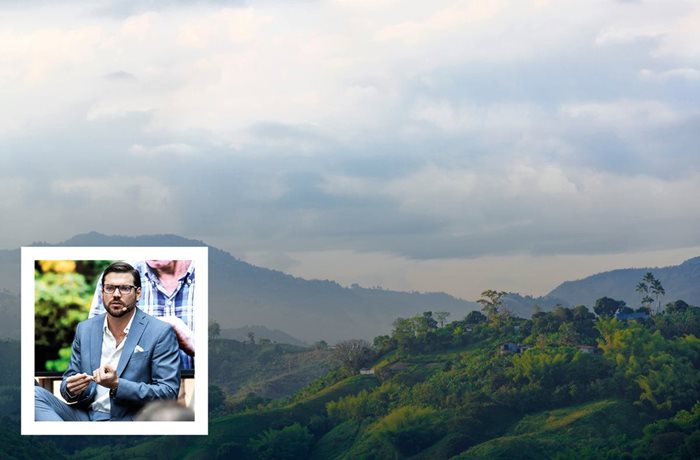In this three-part series, 5THWAVE speaks with influential figures working to support coffee farmers at origin, to discuss the challenges facing coffee communities today and some of the solutions for ensuring the equitable and sustainable production of the coffees we cherish. Catch up on part-one
here.

Main image: Coffee farms in Colombia. Image credit Javier Crespo | Inset: Carlos Ortiz, Co-founder, Volcafe Way
In part-two, we speak with Carlos Ortiz, Co-founder and manager of Volcafe’s sourcing strategy, Volcafe Way, about the ways his company is helping to foster entrepreneurial thinking and promote sustainable profitability for coffee farmers.
Carlos Ortiz
Co-founder, Volcafe Way
In our experience, 95% of coffee farmers do not know what their cost of production is. The reality is that many in the coffee producing industry are not running their farms with a business mindset.
During Volcafe Way’s training courses the whole room will raise their hand when asked ‘who here is a coffee farmer?’ However, virtually none will raise their hand when asked, ‘who in this room is a coffee
entrepreneur?’ The reason is that most coffee producers inherited a family farm, so there is very little entrepreneurial thinking. But if you want to help the development of these communities, you need to change this mindset.
It is very difficult for coffee families to become profitable if they do not know their own costs. In these situations, we tend to see low yields, lesser quality and far higher production costs. This compelled Volcafe Way to think about he we could help these farmers improve their operations to become sustainable and profitable in the longterm. Because if coffee farmers are not profitable every single year, they are risking bankruptcy and this is the reason we are seeing many smallholder coffee farms disappearing.
"Coffee must be a viable livelihood for people in rural communities, or we are going to see more and more people leaving the industry"
The Volcafe Way programme seeks to improve business knowledge among coffee farmers so that they can make better decisions. For this to happen, farmers need to become familiar with a range of topics, including agronomy, finance and business administration. It is also important for them to learn about social and environmental best practice so that they can become truly holistic and sustainable business people.
Another major issue facing coffee farmers today is a lack of access to finance and credit. To be a sustainable coffee producing business you need cash flow to buy your inputs.
Coffee must be a viable livelihood for people in rural communities, or we are going to see more and more people leaving the industry. However, in many cases growing coffee alone is not a sufficient source of income for farmers, so they need help to diversify – either by growing other profitable crops, such as avocados – or by providing services to neighbouring farms, such as land clearance.
But there is another route – paying for the environmental value farmland provides. This can involve paying farmers to keep trees on their land or protect water springs. These carbon green credits can provide a valuable additional source of income for coffee farmers.
The carbon credits industry within the coffee supply chain is still in its nascent stages, but much of Volcafe Way’s work today involves collecting carbon, water and energy data across different coffee producing regions. We work with major roasters and partners from across the global coffee industry to help them formulate their Sustainable Development Goals (SDGs), pursue their environmental indicators and ensure that these are occurring in their coffee supply chains.
"It is very difficult for coffee families to become profitable if they do not know their own costs"
Our 250-strong field team reports on these indicators, enabling our partners to communicate their progress to customers on a given metric and where more work needs to be done. When roasters promote these sustainability programmes at origin, they help consumers understand the realities and context of the communities producing their daily cup of coffee.
There is a very complex network of positive reactions that can come from farmers adopting the entrepreneurial mindset. For example, farmers who know their production costs can reduce the number of days’ labour per hectare from 200 to 40.
A family farm that is more productive with better quality crops and reduced costs is now more profitable. That means they can invest in community development, send their kids to school and repair roads to enable more commercial access from other villages. Increased profitability also means coffee farms are more resilient to pests, diseases and the effects of a warming climate.
This fosters real sustainability in the coffee industry, environmentally, economically and socially.
In part three we speak with Rebecca Hodgson, Head of Project Waterfall, a water charity focussed on coffee growing communities, who explains how access to clean water and sanitation is a key piece in the sustainability puzzle.
This article was first published in Issue 6 of 5THWAVE magazine.
Subscribe to 5THWAVE to receive each edition in print and digitally or sign up to our newsletter and be the first to read the latest articles and updates on World Coffee Portal research
